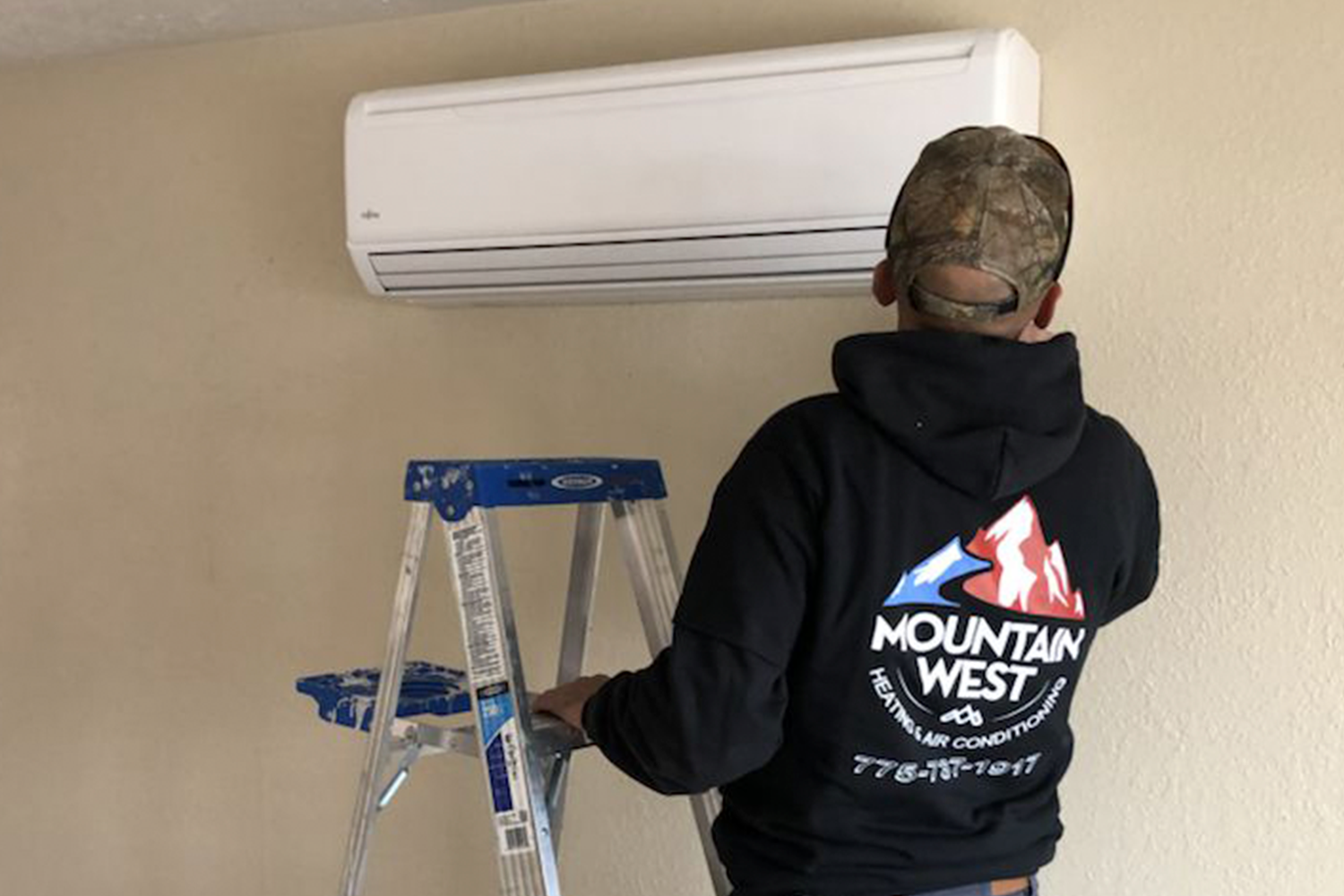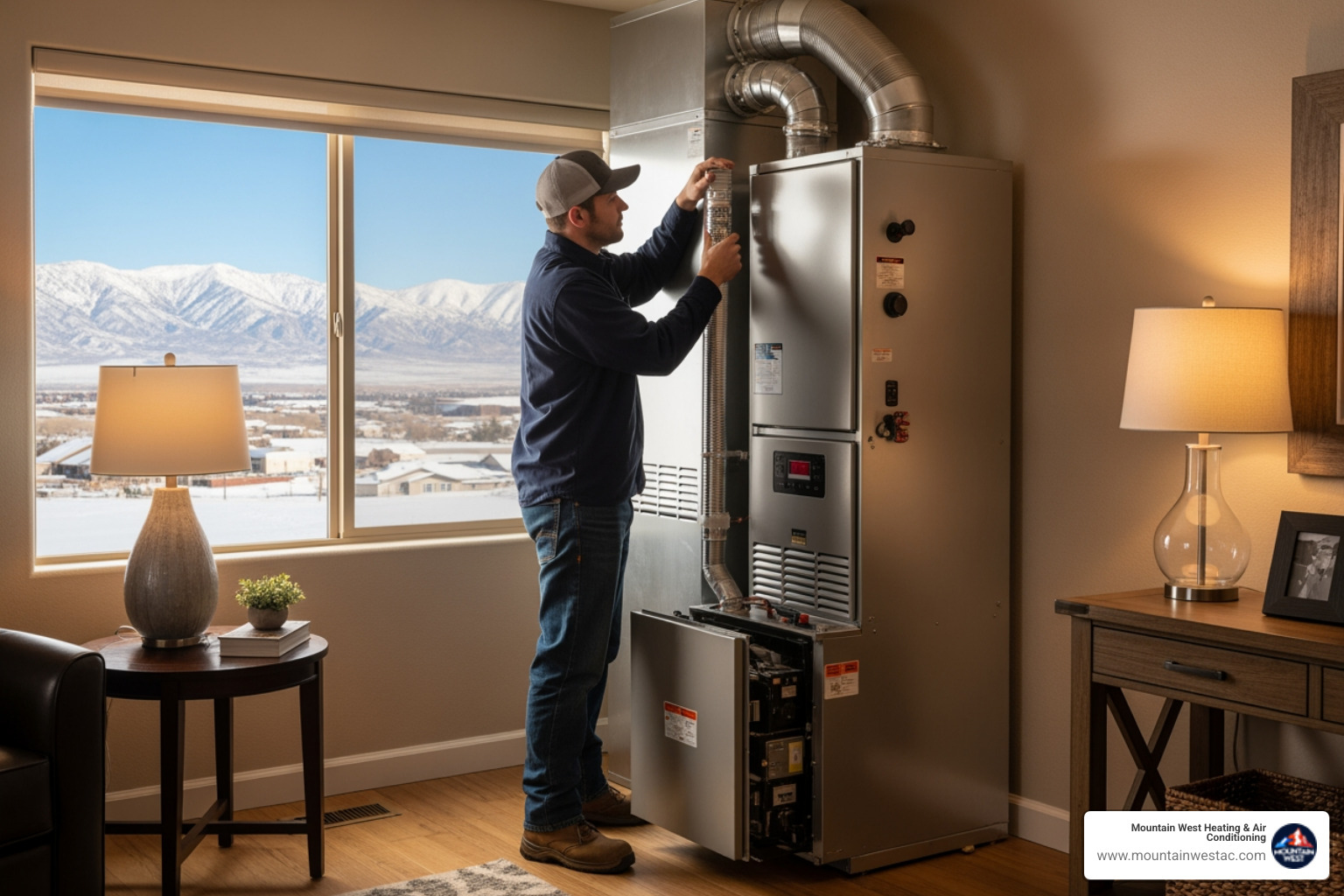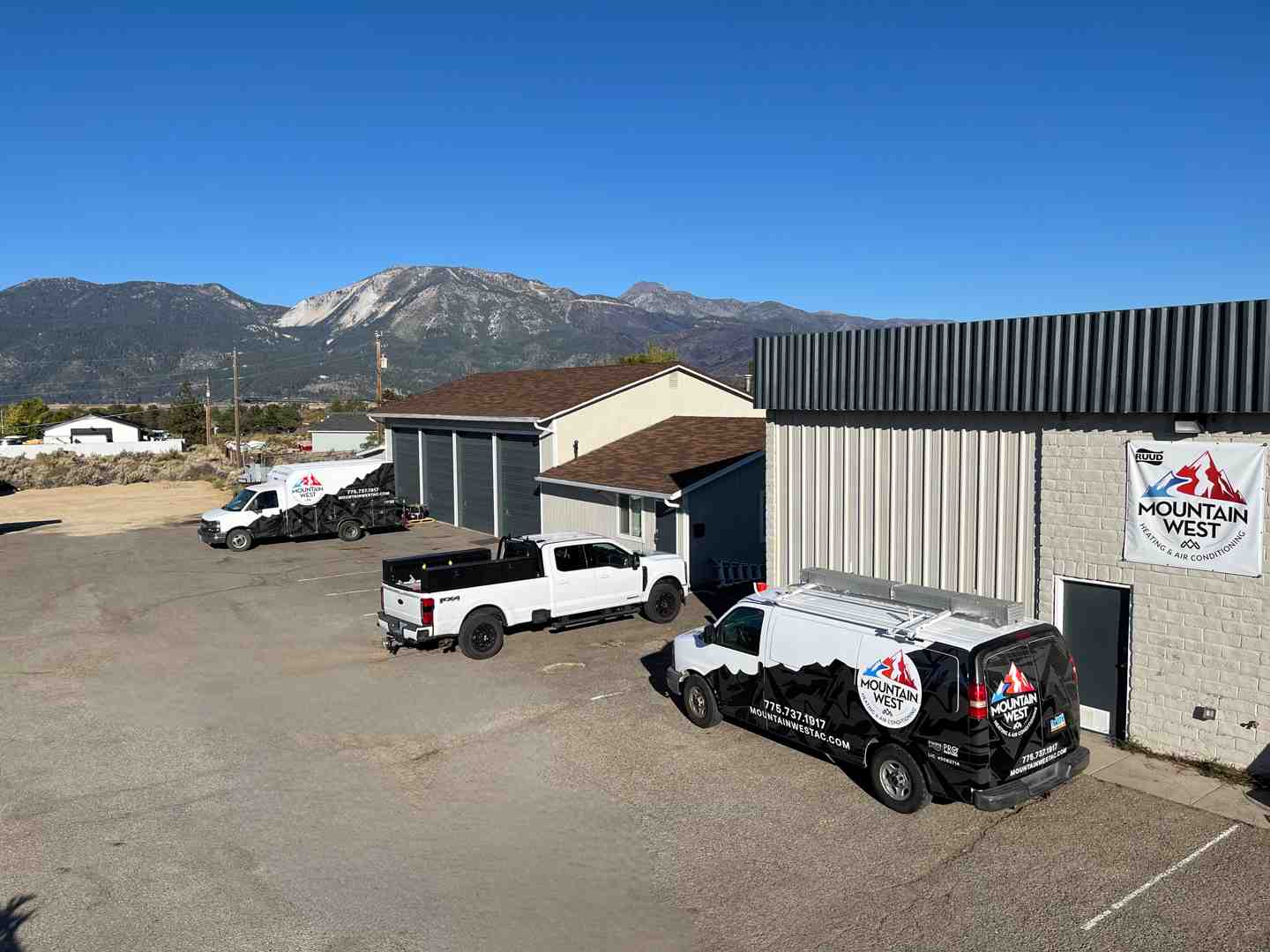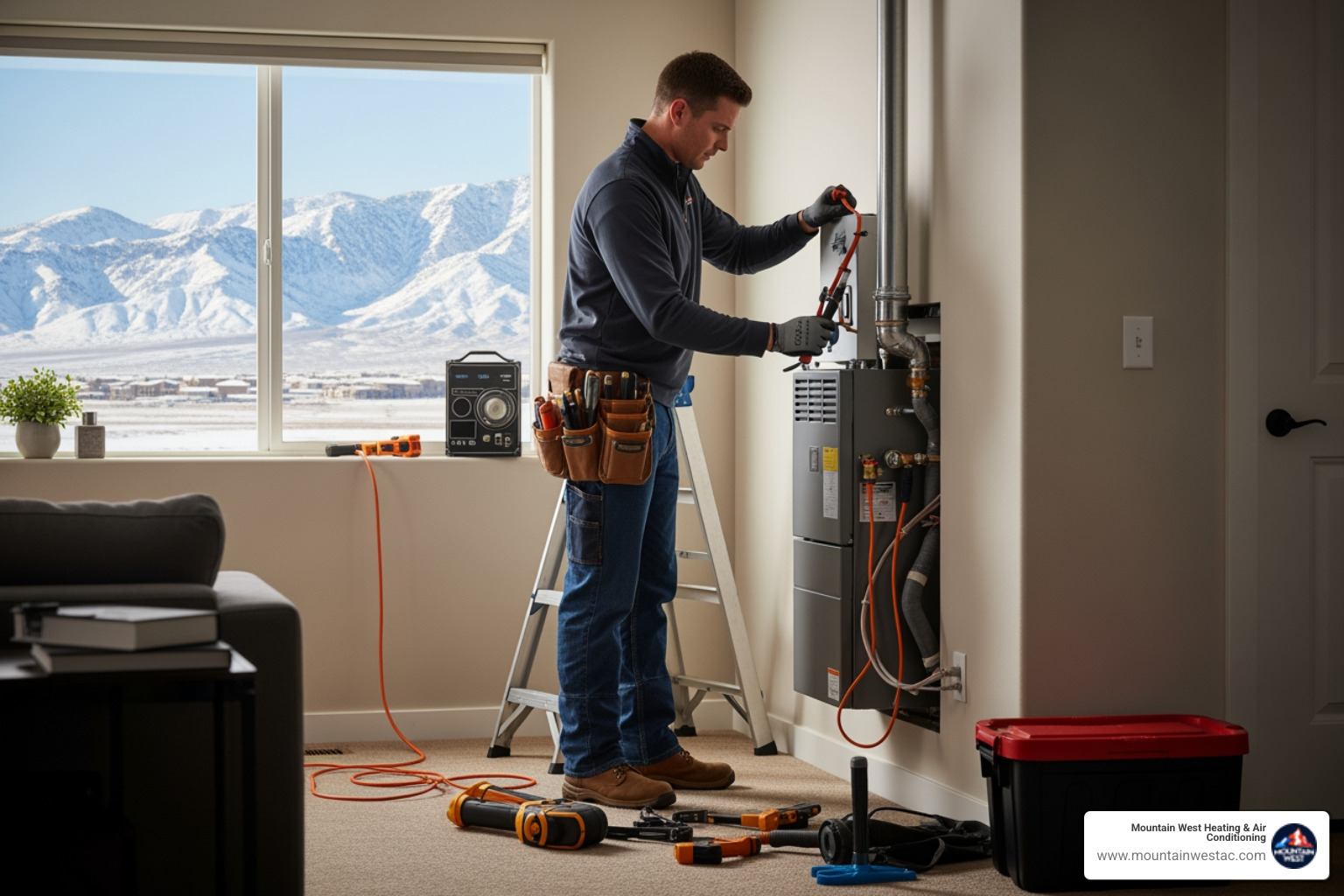Your AC unit turning into a block of ice isn't just annoying, it's a sign that something is wrong with your system. When your air conditioner freezes up, it can't cool your home properly and may even cause expensive damage if you don't fix it quickly.
The most common reasons your AC freezes are dirty air filters, low refrigerant levels, blocked vents, and poor airflow through the system. We've seen these same problems cause freeze-ups in homes across Northern Nevada, and the good news is that many of them are easier to fix than you might think.
We'll walk you through exactly why AC units freeze, how to spot the warning signs before it happens, and what steps you can take to get your system running smoothly again. You'll also learn simple ways to prevent this frustrating problem from coming back.
Here's what you need to know:
- Why air conditioners freeze up in the first place
- Common causes of a freezing AC unit
- Signs your AC is about to freeze up
- What to do if your AC freezes
- Preventing future AC issues in Northern Nevada
By the end, you'll understand why your AC is freezing up, what causes this issue, and how expert maintenance can prevent costly repairs.
Why air conditioners freeze up in the first place
Air conditioners freeze when three main problems occur: refrigerant levels drop or air gets blocked, ice forms on the evaporator coils, and outside temperatures affect how well your system works.
Low refrigerant and airflow restrictions
Refrigerant leaks cause your AC to freeze quickly. When refrigerant levels drop, the remaining liquid gets too cold and freezes the evaporator coil.
We see this happen when copper lines develop small holes or connections loosen over time. Your system needs the right amount of refrigerant to work properly.
Dirty air filters block airflow and cause freezing. When air can't move freely, the evaporator coil gets too cold.
Most people forget to change their filters every 1-3 months. A clogged filter makes your system work harder and ice up faster.
Blocked vents and ducts also restrict airflow. We find that closed vents in unused rooms can cause problems throughout your whole system.
Furniture, curtains, or debris blocking vents creates the same issue as dirty filters.
According to the U.S. Department of Energy, restricted airflow from dirty filters, blocked vents, or clogged coils reduces system efficiency by up to 15% and significantly contributes to coil freezing issues, making regular airflow checks critical to avoid AC freeze-up.
The role of evaporator coils and condensation
The evaporator coil removes heat from air inside your home. This coil contains cold refrigerant that absorbs heat.
When airflow problems happen, the coil gets too cold. Normal condensation turns into ice instead of draining away.
Ice buildup starts small but grows quickly. A thin layer of frost becomes thick ice that blocks more airflow.
This creates a cycle where less air means colder coils and more ice. The ice acts like insulation and makes the problem worse.
Dirty coils freeze faster than clean ones. Dust and dirt on the coil surface trap moisture and help ice form.
We recommend cleaning evaporator coils annually to prevent this buildup.
How ambient temperature affects AC function
Outside temperature changes how your AC works. Most systems struggle when outdoor temps drop below 60°F.
The refrigerant doesn't flow properly in cold weather. This makes the indoor coil too cold and causes freezing.
Running AC in cool weather often causes freeze-ups. Many people don't realize their system isn't designed for cold days.
We see this problem in spring and fall when days are warm but nights get cold.
Low nighttime temperatures combined with continuous AC use create perfect freezing conditions. The system can't adjust to the temperature drop.
Set your thermostat higher when outdoor temps fall below 65°F to prevent freezing.
Common causes of a freezing AC unit
Several key issues can cause your AC unit to freeze up repeatedly. Poor airflow from dirty filters and blocked ducts, along with mechanical problems like fan malfunctions and low refrigerant levels, are the main culprits we see.
Can a dirty air filter cause AC to freeze?
Yes, a dirty air filter is one of the most common reasons we see AC units freeze up. When your filter gets clogged with dust and debris, it blocks airflow over the evaporator coils.
Without proper airflow, the coils get too cold. The temperature drops below freezing, causing ice to form on the coils.
Signs your filter needs changing:
- Reduced airflow from vents
- Ice buildup on indoor unit
- Higher energy bills
- Unit running longer cycles
We recommend checking your filter every 30 days. Replace it when it looks dirty or every 1-3 months depending on usage.
A clean filter allows proper air circulation. This keeps the evaporator coils at the right temperature and prevents freezing.
How clogged ducts and blocked vents contribute
Clogged ducts and blocked vents create the same problem as dirty filters. They restrict airflow throughout your system.
When air cannot flow properly, your evaporator coils do not get enough warm air passing over them. This causes the coils to drop below freezing temperature.
Common airflow blockages include:
- Furniture placed over vents
- Closed dampers in ductwork
- Dust buildup in air ducts
- Collapsed or damaged ducts
We find that even one blocked return vent can cause freezing issues. Check all your vents to make sure nothing is covering them.
Professional duct cleaning may be needed if you have significant buildup. Clean ducts help maintain steady airflow and prevent ice formation.
Malfunctioning fans or low refrigerant levels
Fan problems and low refrigerant are more serious causes that need professional repair. Both issues affect how well your system moves heat.
A broken blower fan cannot circulate air over the evaporator coils. Without this airflow, the coils freeze quickly.
Low refrigerant levels cause the remaining refrigerant to expand too much. This makes the evaporator coils extremely cold, leading to ice buildup.
These issues require professional help:
- Refrigerant leaks need proper sealing
- Fan motors may need replacement
- Electrical connections require safe handling
We do not recommend trying to fix these problems yourself. Refrigerant handling requires special licenses and equipment for safety.
Signs your AC is about to freeze up
Your AC will usually give you warning signs before it completely freezes up. We can spot these early signs by watching for reduced cooling power, visible ice formation, and unusual sounds from the system.
Reduced cooling performance and weak airflow
The first sign we notice is weak airflow from our vents. Air barely moves through the registers even when the fan runs at full speed.
Our rooms stay warm despite the thermostat setting. The system runs longer but fails to reach the set temperature.
Cooling performance drops before ice forms. We feel warm air coming from vents that should blow cold air. This happens because restricted airflow reduces heat transfer at the evaporator coil.
Common airflow problems include:
- Dirty air filters blocking air movement
- Closed or blocked vents in rooms
- Ductwork problems or leaks
- Failing blower motor
We should check these issues first when cooling drops. The sooner we fix airflow problems, the less likely our system will freeze completely.
Ice buildup on outdoor or indoor units
Ice buildup starts small and grows quickly. We might see frost on the evaporator coil inside the indoor unit first.
Ice forms on the outdoor unit's refrigerant lines. These copper pipes develop white frost or clear ice coating. The ice usually appears on the larger, insulated line first.
We can spot ice on the outdoor condenser unit too. Ice covers the metal fins and blocks airflow through the unit.
Inside our home, we might see ice on:
- Air handler cabinet
- Evaporator coil housing
- Refrigerant lines near the indoor unit
Water drips from unusual places when ice melts. Our drain pan might overflow if too much ice melts at once.
Strange noises or a system that won't shut off
System noises change when freezing starts. We hear the blower motor working harder as ice blocks airflow.
Our system runs non-stop without reaching the set temperature. It never cycles off like it normally does every 15-20 minutes.
Strange sounds we might hear include:
- Loud humming from the indoor unit
- Grinding or squealing from the blower
- Clicking sounds from the outdoor unit
- Water dripping inside walls or ceilings
The outdoor unit might make ice cracking sounds. We hear popping or snapping as ice expands on the coils.
Our system might shut off completely if safety switches activate. This protects the equipment from damage when ice blocks too much airflow.
What to do if your AC freezes
A frozen AC needs immediate attention to prevent damage and get your cooling back on track. We'll walk you through the right steps to take and help you know when it's time to call in the experts.
Should you turn off your AC if it's not cooling?
Yes, you should turn off your AC immediately if you notice ice buildup or if it's running but not cooling your home.
Continuing to run a frozen AC can cause serious damage to the compressor. This part costs hundreds or thousands of dollars to replace.
Turn off the system at your thermostat first. Then go to your electrical panel and switch off the breaker for your AC unit.
Signs you need to shut down right away:
- Ice on the outdoor unit
- Ice on refrigerant lines
- Water pooling around the indoor unit
- AC running but no cold air coming out
- Unusual sounds from the unit
Don't try to chip away ice with tools. This can damage the coils and refrigerant lines.
Let the ice melt completely before doing anything else. This usually takes 2-4 hours depending on how much ice formed.
Step-by-step first response for homeowners
Once you've turned off the power, follow these steps to address the immediate problem.
Step 1: Check your air filter Remove the filter and hold it up to light. If you can't see through it clearly, replace it with a new one.
Dirty filters block airflow and cause freezing. This is the most common cause we see.
Step 2: Clear all vents and returns Walk through your home and remove furniture, curtains, or objects blocking air vents. Check that all vents are open.
Step 3: Wait for complete thaw Don't rush this step. All ice must melt before you restart the system.
Step 4: Restart carefully Turn the breaker back on. Set your thermostat to fan only for 30 minutes to circulate air.
Then switch to cooling mode and monitor for 2-3 hours. Watch for ice reformation.
Step 5: Monitor closely Check the unit every hour for the first day after restarting.
When to call for professional AC maintenance or repair
Some AC freezing problems need professional help to fix safely and correctly.
Call a technician immediately if:
- The unit refreezes after you restart it
- You find refrigerant leaks (oily spots near the unit)
- The fan isn't running when it should
- You hear grinding, squealing, or banging sounds
- Ice keeps forming even with a clean filter
Problems that require professional repair:
- Low refrigerant levels
- Damaged coils
- Faulty fan motors
- Blocked drain lines
- Thermostat malfunctions
Don't attempt to add refrigerant yourself. This requires special tools and training. Adding the wrong amount can damage your system.
Get professional maintenance if:
- Your AC is over 5 years old and hasn't been serviced recently
- This is the second time it's frozen in one season
- You're not comfortable doing the basic troubleshooting steps
A trained technician can find the root cause and prevent future freezing. They have tools to check refrigerant levels, test electrical components, and clean parts you can't reach.
Preventing future AC issues in Northern Nevada
Regular maintenance and professional care keep your AC running smoothly through Nevada's extreme temperatures. Smart scheduling and trusted local expertise prevent costly breakdowns before they happen.
How regular AC maintenance keeps your system efficient
We recommend scheduling professional maintenance twice yearly to prevent freezing and other common AC problems. Regular maintenance catches small issues before they become expensive repairs.
According to a 2013 NREL field study, more than half of residential air conditioning systems have significant operational defects, and proper maintenance—such as coil cleaning, refrigerant checks, and airflow diagnostics—can reduce energy use by as much as 50% and prevent freeze-related failures.
Key maintenance tasks include:
- Cleaning evaporator and condenser coils
- Checking refrigerant levels
- Inspecting electrical connections
- Testing thermostat accuracy
- Clearing condensate drain lines
Clean coils work more efficiently and prevent ice buildup. When coils get dirty, they can't absorb heat properly. This causes the system to work harder and freeze up.
Professional technicians also check airflow throughout your system. Poor airflow is one of the main causes of AC freezing. We ensure all vents stay clear and ductwork functions correctly.
Seasonal checkups and filter replacement schedules
Northern Nevada's dusty conditions require more frequent filter changes than other regions. We suggest changing standard filters every 30-60 days during peak summer months.
Seasonal maintenance schedule:
- Spring (March-April): Pre-cooling season inspection
- Fall (October): Post-summer system check
- Monthly: Filter inspection and replacement
- Quarterly: Outdoor unit cleaning
High-efficiency filters last longer but still need regular replacement. Clogged filters restrict airflow and cause coils to freeze. Check filters monthly and replace them when they look dirty.
Spring checkups prepare your system for summer heat. We inspect refrigerant levels and test all components before temperatures rise. Fall maintenance addresses any damage from heavy summer use.
Why Mountain West is trusted for long-term AC care
Mountain West understands Northern Nevada's unique climate challenges. We've served local families for years and know how desert conditions affect AC systems.
Our technicians receive ongoing training on the latest AC technology. We use quality parts and offer comprehensive warranties on our work. Local expertise means faster service calls and better understanding of regional issues.
Our maintenance programs include:
- Priority scheduling for emergency repairs
- Discounted service rates for members
- Detailed system reports after each visit
- Reminders for filter changes and checkups
We stock common parts for Northern Nevada's most popular AC brands. This means same-day repairs for most issues. Our local presence ensures reliable service when temperatures soar.
Conclusion
A frozen AC is a sign that something needs attention in your system. We've covered the main causes that lead to ice buildup on your unit.
Simple fixes like changing filters and clearing vents can prevent many freeze-ups. These steps cost very little but save you from expensive repairs.
Regular maintenance keeps your AC running smoothly. We recommend checking filters monthly and scheduling yearly tune-ups.
If your AC freezes, turn it off immediately. Let the ice melt completely before restarting. Running a frozen unit can damage expensive parts.
Remember that prevention costs less than repairs. Keep filters clean, vents open, and schedule regular service. These steps help your AC work efficiently all season long.
Most freeze-up problems have straightforward solutions. Start with the simple fixes first. If problems continue, contact an HVAC technician for help.
Schedule professional AC maintenance today to stop your unit from freezing up and ensure reliable cooling all season.









